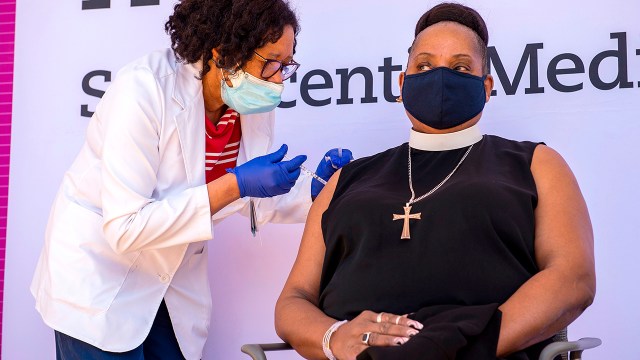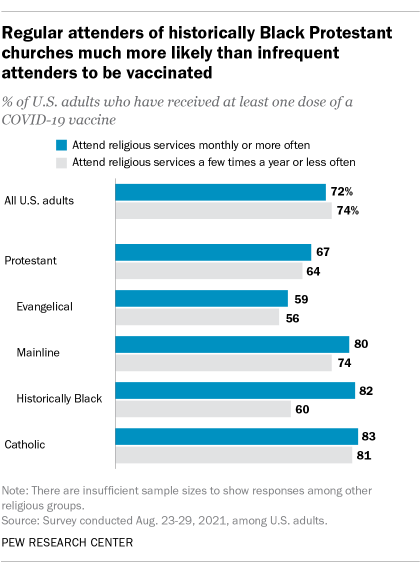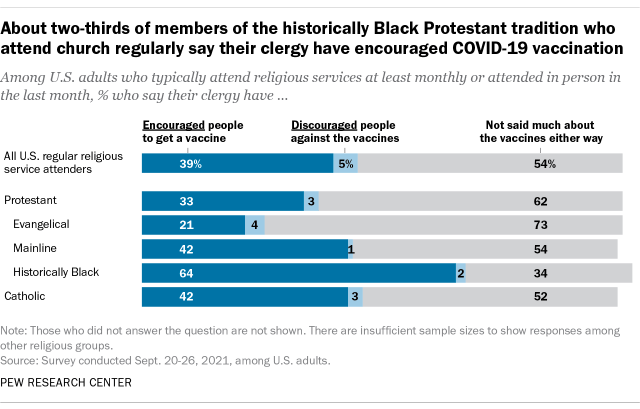
Religious institutions have helped shape many Americans’ experience of the COVID-19 pandemic, from providing virtual spaces for community and worship to offering a range of opinions about the importance of wearing masks and getting vaccinated.
Black churches in particular, which often play prominent roles in Black civic life, have received a lot of attention for holding vaccination clinics and urging members to get a coronavirus shot. And according to a new Pew Research Center analysis, members of the historically Black Protestant tradition who regularly attend church are more likely to be vaccinated than those who do not attend regularly.
Roughly eight-in-ten members (82%) of the historically Black Protestant tradition who attend church once a month or more have received at least one dose of a COVID-19 vaccine, compared with 60% of those from the same religious tradition who attend church less often, according to the analysis, based on a survey conducted Aug. 23-29, 2021. A later poll, fielded Sept. 20-26, sheds some light on possible explanations for this large gap: Nearly two-thirds of regular churchgoers in the historically Black Protestant tradition (64%) say that their pastors have encouraged people to get a COVID-19 vaccine.
Pew Research Center conducted this analysis to better understand the connections between religion and COVID-19 vaccination. Data on vaccination status comes from a survey of 10,348 U.S. adults conducted Aug. 23-29, 2021. Here are the questions used in the August survey, along with responses, and its methodology.
Data on advice from clergy comes from a survey of 6,485 U.S. adults conducted Sept. 20-26, 2021. Here are the questions from the September survey, along with responses, and its methodology. All respondents to the surveys were part of Pew Research Center’s American Trends Panel (ATP), an online survey panel that is recruited through national, random sampling of residential addresses. This way nearly all U.S. adults have a chance of selection. The survey is weighted to be representative of the U.S. adult population by gender, race, ethnicity, partisan affiliation, education, religious affiliation and other categories. For more, see the ATP’s methodology.
For Americans overall, church attendance is not associated with a significantly higher or lower chance of having received a COVID-19 vaccine, with similar shares of U.S. adults who routinely attend religious services (72%) and those who do not attend regularly (74%) saying they received at least one shot. Moreover, among U.S. adults who regularly attend religious services, 39% have been encouraged by clergy at their houses of worship to get the vaccine, while most (54%) say their clergy have not said much about the vaccines either way.
There are other factors involved, aside from the different roles that churches and clergy play in different communities. In some Christian traditions, such as among Catholics and evangelical Protestants, regular attenders are more likely than those who attend less often to align with the Republican Party – and Republicans are less likely than Democrats to be vaccinated. But in historically Black churches, members are overwhelmingly Democrats or Democratic leaners, whether or not they regularly attend church.
Members of the historically Black Protestant tradition who regularly attend church are also older, on average, than those who do not, and older Americans in general are more likely to be vaccinated. But age alone does not explain the wide gap in vaccination between churchgoers and others in the historically Black Protestant tradition.
Since their earliest days in the 19th century, Black churches have been active in Black civic life beyond being places of worship. To counter lack of access to public services and economic opportunity, Black churches have often run job training programs, insurance cooperatives, circulating libraries and athletic clubs.
Earlier in the COVID-19 pandemic, Black Americans were less likely than White Americans to have received at least one dose of a vaccine and were more likely to express hesitancy to do so. The vaccination gap has closed, perhaps in part due to partnerships between Black church leaders and vaccine providers.
In fact, people who regularly attend Black Protestant churches have unusually high levels of confidence in their pastors and other religious leaders to provide guidance on the COVID-19 vaccines. About eight-in-ten churchgoing members of the historically Black Protestant tradition (78%) say they have either a great deal of confidence or a fair amount of confidence in their clergy or other religious leaders to provide this guidance. Similar shares have confidence in the guidance they receive from public health officials, such as those at the Centers for Disease Control and Prevention (CDC), or their primary care doctors (77% and 80%, respectively). Among all U.S. adults who regularly attend religious services, 61% trust their religious leaders to provide guidance on the vaccines.





